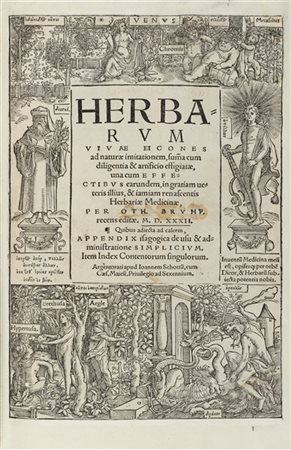 Il Ponte Casa d'Aste - Palazzo Crivelli - Via Pontaccio 12, 20121 Milano
Il Ponte Casa d'Aste - Palazzo Crivelli - Via Pontaccio 12, 20121 Milano
ASTA 487 : LIBRI E MANOSCRITTI II TORNATA : LIBRI E MANOSCRITTI
martedì 22 settembre 2020 ore 15:30 (UTC +01:00)
BRUNFELS, Otto (ca. 1489-1534) - Herbarum vivae eicones ad naturae imitationem
BRUNFELS, Otto (ca. 1489-1534) - Herbarum vivae eicones ad naturae imitationem ad naturae imitationem. Strasburgo: Johann Schott, 1532-36 (introduzione datata 1530).
Celebre opera di Brunfels, uno dei padri della botanica tedesca e considerato da molti come l'ideatore della botanica moderna. Insieme a Bock e Fuchs, diede il via a una nuova epoca di "osservazione botanica" rompendo dalla tradizione finora conosciuta degli antichi erbari in cui venivano presentate le piante senza alcuna considerazione personale o studio supplementare. Brunfels esigeva che le piante fossero ricopiate dal vivo dall'incisore Hans Weiditz (nato nel 1500 ca. e morto nel 1536) aprendo così a nuovi orizzonti la scienza moderna (Hunt). Non vi era paragone tra le copie dal vivo eseguite appunto dall'illustratore rispetto a quelle che potevano trovarsi fino a questo momento nei libri; le illustrazioni ricordano infatti Durer e più di una volta furono attribuite erroneamente al grande maestro, come anche, a un altro celebre incisore quale Burgkmaier (Blunt). Hans Weiditz e Burgkmaier erano colleghi di studio e qui nel 1529 Weiditz lavorò ai legni per questo testo il cui primo volume apparve nel 1530 (gli altri furono invece pubblicati dopo la morte dell'artista nel 1536 e furono illustrati da altri incisori). I disegni originali andarono persi fino al 1930 quando 77 furono riscoperti nel Felix Platter Herbarium a Berna.
3 parti in un volume, folio (283 x 191mm). Frontespizio entro elaborata cornice xilografica (frontespizio rimarginato con alcune perdite ai lati, generalmente lavato e sbiancato, alcune lettere integrate a penna al frontespizio, A2-A3, talvolta leggermente rifilato, foro di tarlo all'angolo inferiore delle prime carte riparato e alcuni altri fori riparati, ultima carta rimarginata con alcune piccole perdite di testo reintegrate). Pergamena antica rimontata (restaurata), titolo manoscritto al dorso. La segnatura è la seguente: A4, a6, b4, c-z6, A-F4, G6 (G6 bianca), A8, b6-g6, h4, i6-l6, p6 (erroneamente rilegata qui), m4, n6-o6, q6-z6, A4-B4, C6 (C6 bianca), A6-T6, V8. Si allega scheda di restauro.
-EN
BRUNFELS, Otto (ca. 1489-1534) - Herbarum vivae eicones ad naturae imitationem ad naturae imitationem. Strasbourg: Johann Schott, 1532-36 (introduzione datata 1530).
"Brunfels was the first great mind in modern botany, and, as Sachs says, a new epoch of natural science began with Brunfels, Bock, and Fuchs. They broke away from the tradition of the old herbals which, except for the Gart der Gesundheit of 1485, had never represented any original thinking. Brunfels demanded that his plants be drawn from life and, through Weiditz' skill, opened up new horizons for future scientists; his appreciation of Weiditz' work is glowingly expressed in a poem at the beginning of the book, and thus for the first time the illustrator of a botanical book achieved recognition" (Hunt). "A whole world separates these vigorous, well-observed drawings from even the best figures in the German Herbarius of 1485. We are at once reminded of Dürer; and much of Wieditz's work has in fact been falsely attributed at one time or another to that great master, or to Burgkmaier" (Blunt). Hans Weiditz (born before 1500, died c.1536) was a colleague in Hans Burgkmaier's studio, where he worked as a draughtsman for book illustrations. In 1529 he produced the drawings for the woodcuts of Brunfels's herbal, the first volume of which appeared in 1530 (the third volume, published posthumously in 1536, is illustrated by artists other than Weiditz). His original drawings were lost until 1930, when seventy-seven of them were rediscovered in the Felix Platter Herbarium in Bern.
3 parts in one volume, folio (283 x 191mm). Title within elaborate woodcut border (title remargined with some minor loss at margins, generally washed, some letters integrated by hand including on title, A2-A3, sometimes slightly cropped, small wormhole repaired at bottom corner, some others repaired wormholes, final leaf remargined with some letters supplied). Early vellum (remounted and restored), manuscript title on spine. The collation is as follows: A4, a6, b4, c-z6, A-F4, G6 (G6 blank), A8, b6-g6, h4, i6-l6, p6 (misbound here), m4, n6-o6, q6-z6, A4-B4, C6 (C6 blank), A6-T6, V8. Inserted is a restoration report.


